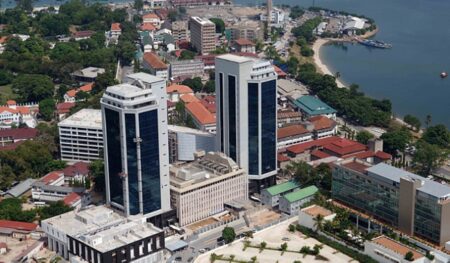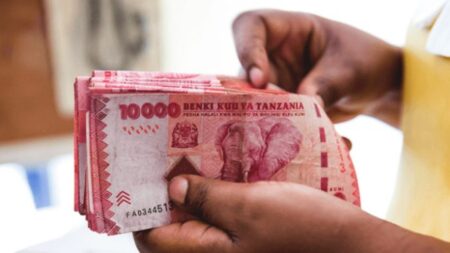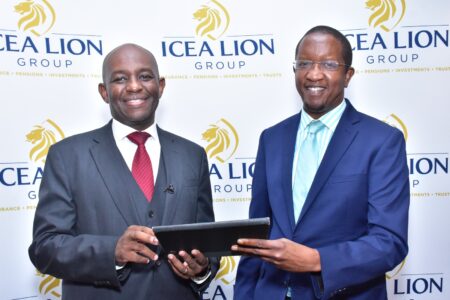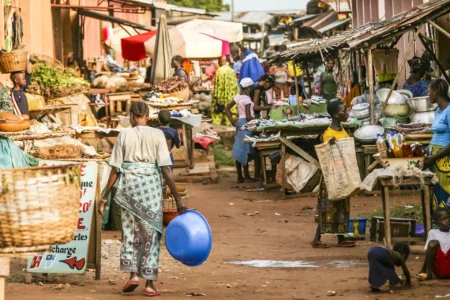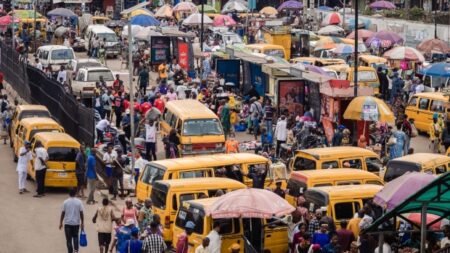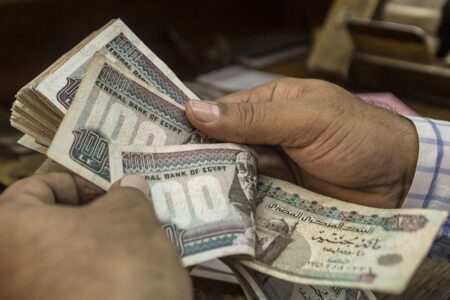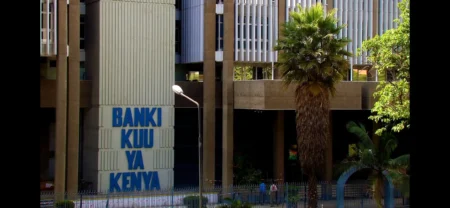- The silent struggle: Women entrepreneurs in Africa and the financial divide
- Questions and answers on confirmation of war crime charges against Joseph Kony at the ICC
- The critical need for energy access in Africa: A roadmap to prosperity
- Killings, abductions, cruel laws worsen East Africa’s human rights record
- Will the Kampala Declaration deliver for African farmers amid climate change?
- Investments in ports, ICT and agriculture key in landmark Kenya-UAE trade pact
- The Just Energy Transition in Africa: Lessons from South Africa and Senegal
- Mukuru Wallet poised to bolster financial inclusion in Zimbabwe
Browsing: inflation
- Central banks across Africa weighing interest rates in the next three weeks are poised to lower them, cautious that the opportunity to ease further may dissipate after President Trump formally assumes office.
- The Trump presidency is anticipated to strengthen the dollar further, primarily due to his commitment to significantly raising tariffs on imported goods.
- A new wave of inflation, driven by the strengthening dollar from the Trump effect, would exacerbate the already high inflation rates in many African countries.
Donald Trump’s return to the Whitehouse sent the dollar surging against both G10 and emerging market currencies in a change that has potentially far-reaching macroeconomic repercussions for African nations.
As Trump’s victory became evident, the “Trump Trade” pushed 10-year Treasury yields up by 0.16 per cent to 4.44 per cent. Meanwhile, the dollar index, which measures the dollar’s performance against a basket of major currencies, saw its largest single-day increase since …
- Tanzania has received $149.4 million for budget support from the IMF.
- The lender has commended Dodoma’s ongoing economic reform and diversification plan.
- IMF approves $786.2 million for Resilience and Sustainability Facility (RSF)
Days after the International Monetary Fund (IMF) ranked Tanzania third on its list of top-performing African economies, its Executive Board has announced an immediate disbursement of about $149.4 million for budget support after completing the third review of the country’s Extended Credit Facility (ECF).
“The Executive Board also approved a 23-month arrangement under the Resilience and Sustainability Facility (RSF) of about US$786.2 million to support Tanzania’s efforts to build resilience to climate change,” the IMF reports.
In its report, the IMF attributed Dodoma’s economic performance to the country’s commitment to economic reform and diversification. The multilateral lender noted that the country is currently focusing on attracting foreign investment, promoting sustainable development, and fostering a favorable business climate.
The …
- Inflation in Tanzania has gone down to 3%, lower than Kenya’s 4.3% and Uganda’s 4% posted in July.
- While economic experts commend the country’s monetary policy for managing inflation, economic woes facing the poor persist.
- Policymakers in Tanzania project to control inflation within the National Vision 2020-2025 target of 3.3 to 4.4%.
Inflation in Tanzania has inched slightly lower to 3.0 percent, compared to 3.1 which was recorded in June, the National Bureau of Statistics (NBS) has reported. The NBS attributes this reduction to the country’s Monetary Policy Committee (MPC) in controlling inflation.
“What lower inflation means is that the cost of living has reduced…the price of goods and services have gone. The current efforts have ensured inflation remains within acceptable limits,” Central Bank’s Directorate of Research and Policy, Mr. Marwa Patrick commended the MPC as strategic and successful.
“This achievement reflects meticulous fiscal and monetary policies and …
- Kenya’s economic resurgence in 2024 proving a reality following a notable upturn in recent months, marked by positive indicators across sectors.
- According to CBK, leading indicators point to the continued strong performance of the Kenyan economy in the first quarter of 2024.
- According to the World Bank, Kenya’s economic growth is projected to be 5.2 per cent, boosted by increased investment in the private sector as the government reduces its activities in the domestic credit market.
A strong rebound
Kenya’s economic prospects are looking brighter, attributed to the interventions by the World Bank and the International Monetary Fund, which have played a massive role in easing volatility witnessed less than three months ago.
Major economic indicators in the country show that confidence is slowly creeping back after the government secured the International Monetary Fund’s facility to pay back the Eurobond.
The repayments had triggered volatility in financial markets, including the …
- The increasing food prices have majorly occasioned the rise in consumer expenditure.
- In the review period, 50 per cent of the Kenyans polled indicated static income levels over the last year
- 53 per cent of Kenyans polled allocated less than 10 per cent of their income to travel and leisure expenditures.
The slight drop in inflation in Kenya has failed to soften the impact of Increased consumer spending after posting a 42 per cent rise in spending in the past six months. This is after a new survey showed that the country posted a six per cent rise in Kenyan expenditures compared to the preceding three months, which ended December 2023.
According to the latest spending index from ICEA LION Group, Kenyans’ spending escalated by 6 per cent from January to March this year. However, this growth was more subdued than the previous quarter, which witnessed a 36 per
- Following a slow recovery from the debilitating impact of COVID-19, Africa’s economic growth declined to an estimated 3.8 per cent in 2022 and later deteriorated to 3. (https://rescueresponse.com) 3 per cent in 2023.
- Africa is not immune to economic shocks and has recently faced a multi-crisis situation.
- African countries have posted more than 5 per cent output expansions in 2024.
Africas economic outlook
Before COVID-19, Africa experienced 20 years of solid growth and made tangible economic and social progress. However, the COVID crisis brought this progress to an abrupt halt, and many countries, which are under increasingly tight budget constraints, struggled to invest in essential sectors amidst recovering from the aftermath of the health crisis.
Following a slow recovery from the debilitating impact of COVID-19, Africa’s economic growth declined to an estimated 3.8 per cent in 2022 and later deteriorated to 3.3 per cent in 2023.
However, according …
- The Central Bank of Nigeria has decided to increase the minimum capital requirement for lenders to bolster the country’s economy.
- Nigerian banks now face weaker capital ratios and higher impaired loans.
- The last time Nigeria recapitalised its banking sector dates back to 2004.
Minimum capital requirement for lenders
Following the surge in inflation levels, a deteriorating economy, and the plummeting of the Naira, the CBN has decided to increase the minimum capital requirement for lenders to bolster the country’s economy.
asu football jersey
detroit lions jersey
asu football jersey
Florida state seminars jerseys
custom made football jerseys
asu football jersey
College Football Jerseys
Florida state seminars jerseys
asu football jersey
Iowa State Football Uniforms
asu football jersey
Iowa State Football Uniforms
ohio state jersey
asu football jersey
Under the new regulations, the Central Bank of Nigeria has raised the capital threshold for international banks to $359 million …
- Nigeria’s cost of living crisis has been the worst in decades, exacerbated by worsening food insecurity and record inflation.
- The lack of enough resources has led to insecurity in Nigeria as people fight for scarce resources and food.
- In response to Nigeria’s cost of living crisis, Tinubu announced a state of emergency in July and intends to begin grain distribution in the coming weeks.
Tinubu’s Reforms worsen Nigeria’s cost of living crisis
Nigeria, Africa’s largest economy, is grappling with the worst cost of living crisis in decades and a worsening food security situation. A significant portion of the population is experiencing extreme food insecurity. After assuming power in May 2023, Bola Tinubu’s administration adopted bold but unpopular reforms that further strained the already-battered economy.
Nigeria imports food and fuel and was buffeted by rising commodity prices due to a glim global economic situation in the last two years. President Tinubu …
- Egypt’s economy has recently been on life support as the national debt continued to mount.
- The investments from Saudi Arabia and further funds anticipated from the World Bank and IMF will give Egypt enough cash to meet its debt obligations and maintain stability in its recently floated currency.
- The significant official and bilateral support announced and marked policy steps that Egypt has taken will, if maintained, support macroeconomic balancing.
Egypt’s economy on life support
Egypt’s economy has recently been on life support as the national debt continued to mount. The Egyptian currency has weakened against the US dollar, with rising inflation rates close to 30 per cent, occasioning a capital flight. Moreover, the overlapping global shocks and the domestic supply of bottlenecks have adversely impacted the country’s economic activity.
Egypt has also suffered from rising global interest rates and soaring commodity prices in international markets. These overlapping factors widen the …
- Non-performing loans in Kenya surged to a 16-year high of 15 per cent in August 2023.
- The Kenya Bankers Association had called for further monetary policy tightening by the CBK, terming it a cure to elevated non-performing loans.
- According to the CBK data, forex pressure cut lending to the private sector to 8.3 per cent during the review period.
The banking sector regulator has said that Kenya’s private sector players resorted to alternative funding sources to avoid the high lending rates, leading to a drop in non-performing loans during the holiday season.
The continued surge in bank interest rates has hit individuals and businesses hard on the back of the Central Bank of Kenya’s (CBK) elevated benchmark interest rate. This has happened thrice since Governor Kamau Thugge took office, citing the need to support the country’s struggling shilling.
On Tuesday this week, the Central Bank of Kenya increased the benchmark …






